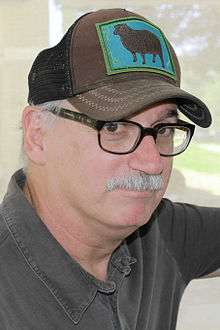Jim Shepard
| Jim Shepard | |
|---|---|
 Shepard at the 2015 Texas Book Festival | |
| Born | Bridgeport, Connecticut |
| Occupation | Author |
| Nationality | American |
Jim Shepard (born 1956) is an American author and professor of creative writing and film at Williams College.
Biography
Shepard was born in Bridgeport, Connecticut. He received a B.A. at Trinity College in 1978 and an MFA from Brown University in 1980. He currently teaches creative writing and film at Williams College. His wife, Karen Shepard, is also a novelist. They are on the editorial board of the literary magazine The Common, based at Amherst College.[1]
Writing
Shepard's work has been published in McSweeney's, Granta, The Atlantic Monthly, Esquire, Harper's, The New Yorker, The Paris Review, Ploughshares,[2] Triquarterly, and Playboy. His short story collection — Like You'd Understand, Anyway — won the Story Prize in 2007, and was nominated for a National Book Award in 2007. The novel Project X won the 2005 Massachusetts Book Award. Along with writing novels and short stories, Shepard has also drafted two screenplays, one about Kenneth Donaldson and the O'Connor v. Donaldson case, and the other a movie adaptation of Project X.
Several features characterize Shepard's writings, including a tendency to finish his stories with what Charles Baxter called an "in medias res ending", or an ending in the middle of the plot's events; a thematic focus on what Shepard calls the "costs of certain kinds of ethical passivity"; and a preference for events-driven plots that fight against what Shepard terms "the tyranny of the epiphany", referencing the more psychological, less active plots popularized by short story writers such as James Joyce. Additionally, Shepard writes from the point of view of characters of a wide variety of nationalities.[3]
Shepard's stories often rely on substantial historical research based on real events. His recent collection, Like You'd Understand Anyway, includes stories about the Greek playwright Aeschylus, the Chernobyl disaster and the 1964 Alaska earthquake. The collection acknowledges over sixty non-fiction works that helped to shape the historical detail in the stories. Similarly, Shepard's 2011 collection You Think That’s Bad also cites an extensive bibliography, including Avalanches and Snow Safety, The Japanese Earthquake of 1923, Climate Changes and Dutch Water Management, and Satanism and Witchcraft. His 2015 novel The Book of Aron involved massive research into the Holocaust, which he called "critically important." [4]
Non c'è ritorno (66thand2nd; 2012) is a previously unpublished collection of Jim Shepard's short stories for the Italian market.[3][5]
Bibliography
Novels
- Flights (1983), ISBN 0-394-53265-1
- Paper Doll (1987), ISBN 0-394-55519-8
- Lights Out in the Reptile House (1990), ISBN 0-393-02784-8
- Kiss of the Wolf (1994), ISBN 0-15-147279-3
- Nosferatu (1998), ISBN 0-8032-9346-1
- Project X (2004), ISBN 1-4000-4071-X
- The Book of Aron (2015)
Story collections
- Batting against Castro (1996)
- Love and Hydrogen (2004)
- Like You'd Understand, Anyway (2007)
- You Think That's Bad (2011)
Miscellaneous
- Editor, with Ron Hansen of You've Got to Read This: Contemporary American Writers Introduce Stories that Held Them in Awe (1994)
- Editor, with Amy Hempel of Unleashed: Poems by Writers' Dogs (1995)
- Editor, Writers at the Movies: Twenty-six Contemporary Authors Celebrate Twenty-six Memorable Movies
References
- ↑ "About". The Common. Retrieved 2013-09-09.
- ↑ "Author Details: Jim Shepard". Ploughshares. 13 August 2010. Retrieved 2013-09-09.
- 1 2 Hodgen, Christie (Spring 2011). "Jim Shepard". Bomb. No. 115. Retrieved 2014-09-01.
- ↑ "Toronto Star". thestar.com. Retrieved 17 May 2015.
- ↑ "Non c'è ritorno" (in Italian). 66thand2nd.com. Retrieved 2014-09-01.